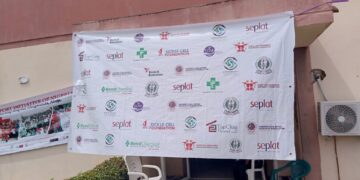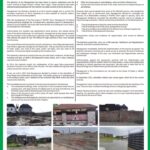By Mon-Charles Egbo
For a valid assessment of the legislature concerning good governance, the first step is to determine the level of commitment of the executive in complementing the legislature.
Hence in this attempt at highlighting the good governance contributions of the 10th Senate so far, it is acknowledged that legislative outputs are only impactful if they are respected by the executive. By the constitution, the legislature is lacking in power and influence, particularly in the aspect of eliciting external compliance. This is common knowledge!
Nonetheless, the legislature must discharge its obligations.
Inaugurated on the 13th of June 2023, the Senate statutorily sat for 15 days before embarking on the annual vacation between August 2nd and September 25th.
Within the period and towards facilitating effective take-off of governance, the Senate screened and confirmed the military service chiefs, the board membership of the North-East Development Commission, the Central Bank Governor and four deputies in addition to the 48 ministerial nominees though it rejected 3. By the same token, it amended and passed the 2022 Supplementary Appropriation Bill “for the provisions of Palliatives and other Items to Nigerians to cushion the effect of fuel subsidy removal and Other Matters”. Again, it approved the presidential request for “Additional Financing of the National Social Safety Net Programme through a facility secured from the World Bank”.
It also processed petitions from constituents who were various victims of injustice at the hands of private and public entities.
Then, of course, motions were considered and bills introduced, which justifiably form the major bulk of this work.
To begin with, the Senate, overwhelmed by the horrible state of the roads, raised a motion on the “Collapse of Road Infrastructure In Nigeria”. The outcome was the setting up of “an Ad-hoc Committee to come up with a compendium of all the affected Federal roads and erosion sites across the country either awarded but abandoned by contractors or have not been awarded at all, to be forwarded to the Executive Arm for urgent intervention”.
But before this one-off approach, it had considered several motions variously demanding interventions on some specific roads. For example, on the “166 Kilometer Abuja-Kaduna Expressway whose contract also provided for increased “Security Surveillance through Deployment of more Personnel and Use of Unmanned Aerial Vehicles (UAVs) such as Drones, Radars and Scanners”, the
Senate recommended a comprehensive analysis of “all funds released for this important project from the award date to the present with the aim of finding out the reason for the delay in completing the project”. It also resolved “to accord similar attention on all other road networks suffering from same conditions”.
On the Umuahia-Umudike-Ikot-Ekpene, Aba-Ikot-Ekpene and Aba-Ossisioma to Port-Harcourt Roads (connecting 3 states and 2 geo-political zones), the
Senate called for the urgent intervention of the federal government supported by an “investigation of the award of the contracts with a view to identifying the factors contributing to the unaccounted delays in the execution”.
Again, the Senate constituted an Ad-hoc Committee “to investigate the reasons for non-completion of the East-West road and the Eleme-Ogoni corridor in Rivers State” and variously called on the federal government to: urgently “commence repairs” and “provide adequate funding to complete the reconstruction” of the Benin-Auchi-Lokoja Road; “review the on-going contract for the rehabilitation of the Calabar-Oban-Ekong Road (in Cross River State) awarded to Setraco Nigeria Limited and fund for the project to enable the contractor to commence and complete the rehabilitation works” and also “commence repairs and reconstruction of the affected parts of the Onitsha-Owerri Federal Road and particularly, the sections between Upper Iweka Roundabout in Onitsha and Oba in Idemili South L.G.A of Anambra State which span about 6 kilometres in addition to urgently fixing “the erosion menace in Ovom, Ogbor-Hill, Aba (Abia State)”.
Quite instructively, the Senate recommended “regular surveillance of Federal highways to identify and nip erosion threats to Federal roads in the bud and also for “the SGF (Secretary to the Government of the Federation) Office to constitute a team of Engineers to tour around and have an overview of erosion sites, design a template for possible control of erosion sites”.
Then on “the Obodoukwu, Uruala, Akokwa, Umumaisiaku, Umuchima and Umueshi Gully Erosion Sites in Ideato South LGAs, Imo State”, the Senate urged “the Ecological Fund Office and the National Emergency Management Agency (NEMA) to jointly and urgently engage relevant experts, including geologists, hydrologists, and environmental engineers, to conduct the assessment and implement measures such as slope stabilization, gabion installations, terracing, re-vegetation, and construction of retaining walls to prevent further losses and minimize the risks to nearby infrastructure, communities, LGAs and states”.
Still on erosion control, the Senate called for the collaboration of federal agencies, namely “the Federal Ministry of Environment, Ecological Fund Office and the Federal Ministry of Works towards tackling the menace of erosion devastation in Edo Senatorial District” and also specifically asked the federal government to “carry out emergency works on Ekpoma (Uhiele, Ujoelen, Ukpenu, Borehole Road & Emuhi), Irrua (Uwasan and Ikekato), Ewu (Egare and Uzogholo), Uromi (Efandion, Eguare & Uzegwa), Udo and Illushi; and then “set up NEMA stations in Edo Central to assist residents in the event of emergency that could lead to loss of lives and properties”.
Intervening on the Onitsha-33-Otuocha-Adani Roads (Anambra State) Boundary to Enugu State, the Senate called for the capturing of the road under the Infrastructure Tax Credit Scheme for design and subsequent contract award “of this economically important road as part of measures to guarantee food security and enhance security of lives and properties”.
Similarly on the issues of flooding in different parts of the country particularly in the Sagamu and Ijebu Areas of Ogun State, Edu and Patigi Areas of Kwara State, as well as the Ikire, Apomu and Gbonga Areas of Osun State”, the Senate called for immediate “release (of) funds as provided in 2023 Appropriation Act for dredging of blocked canals and water bodies among others” and also “to revisit the proposed construction of Dasin Hausa Dam and any other Dam as the case may be to take in the flood waters from Lagdo Dam in Cameroun”. Additionally, it requested “the contractor handling the Ibadan-Ife road to, as a matter of urgency, proceed to the portion affected by the flood at Ikire to avert further damages and allow free flow of traffic” and also for the “the Ecology Fund Office and Federal Roads Maintenance Agency, FERMA, to equally assist in channelization of other affected areas”.
On “the Incessant Sea Incursion Ravaging Ayetoro Community in Ondo State, the Senate has launched “an investigation into the N6.5 Billion-shoreline protection contract awarded by the NDDC (Niger-Delta Development Commission) in 2006 to find an alternative solution where necessary, to stem the dangerous tide” while urging “the National and International Companies operating in the areas to live up to their corporate social responsibility”.
Then, following shocking discoveries about “the Controversial Make-up Gas (MUG) Reprocessing Deal involving the Federal Ministry of Finance, Niger-Delta Power Holding Company (NDPHC), Calabar Generation Company Limited and ACUGAS Ltd” in which Nigeria suffered humongous economic losses, the Senate instituted an investigation on “the circumstances under which the Gas Supply Agreement (GSA) and Make-up Gas (MUG) reprocessing arrangement was executed, the parties involved, payments so far made to entities to date, the status of implementation of the GSA, and for this purpose invite all stakeholders to the transaction including the immediate past Minister of Finance, Budget and National Planning, the Niger Delta Power Holding Company, NDPHC, Acugas Limited; and Calabar GENCO, the Transaction Adviser engaged under the MUG deal, etc.,”.
Also on “the Controversial Huge Expenditure on Premium Motor Spirit (PMS) under the Subsidy/Under Recovery Regime by the Nigerian National Petroleum Company Limited (NNPCL), the senate is “holistically” reviewing all the issues relating to the petroleum subsidy regime.
Similarly, even as elaborate legislative interventions are being developed, the Senate has since set up an Ad-hoc Committee “to investigate all contracts awarded for the rehabilitation of all the State-owned Refineries between 2010 and 2023”.
It has also called on “the Comptroller-General of Customs and the National Security Adviser to review and lift the subsisting restriction order placed on supply of petroleum products to the affected border communities because the removal of Subsidy by the Nigerian government has substantially put paid to the smuggling of the PMS products”, adding that “therefore the products should be allowed to circulate freely without restrictions”.
Dispassionately again, the senate set up an ad-hoc committee “to Holistically Investigate the Disbursement of Loans by Development Bank of Nigeria, NIRSAL and related Banks to Micro, Small and Medium Scale Enterprises (MSMEs) in Nigeria from 2015 to date”.
Relatedly, while the Senate is investigating “the Alarming Cases of Delays in Payment and Allegations of Corruption associated with the Capturing and Payment of newly recruited University Staff under the Integrated Payroll and Personnel Information Systems (IPPIS)”, it urged the “Federal Ministry of Education, the National Universities Commission, Tertiary Education Trust Fund and other agencies involved in the reported Relocation of the University of Agriculture, Mubi, Adamawa State to stop forthwith and maintain status quo pending the investigation by the Senate”.
Understandably moved by its attendant worsening effects on the national security and economy, the Senate mandated its “leadership to interface between the Nigeria Labour Congress and the Federal Government in other to avert the impending strike of the NLC”.
And on the vexed issue of “Age Requirement Precondition for Employment in Nigeria” the Senate intervened by asking “the Federal Ministry of Labour, Employment and Productivity, and other relevant Agencies to prohibit and discourage public and Private employees in Nigeria, from putting up jobs adverts with inherent undertone calculated to deprive any qualified Nigeria being gainfully employed merely by reason of his/her age”. It also called on “the Civil Service Commission and Office of the Head of the Civil Service to immediately revise their guidelines on appointments and promotions in the Federal Civil Service, to remove the impediments as it relates to conditions of appointment in the Federal Civil Service on account of age”.
In the area of health and disturbed by “the Low Level of Awareness and Preparedness to Prevent the Outbreak of Anthrax in Nigeria”, the Senate called on “the Nigeria Centre for Disease Control, and the Federal Ministry of Health to embark on nationwide vaccination of livestock with the anthrax spore vaccine, most especially in the border states of the country”. It also recommended “intensive awareness campaigns to sensitize Nigerians on the outbreak of the anthrax disease, symptoms for early detection, and prevention guidelines”. In the same vein, it urged the Federal Ministry of Health and the Nigeria Centre for Disease Control to liaise with the hierarchy of the Kaduna State Ministry of Health towards intensifying the search for active cases of Diphtheria with contact tracing, risk communication activities and movement of affected cases to health facilities for management, and also intensifying surveillance activities across the 23 LGAs of Kaduna State. It also recommended “universal childhood immunization all over the country to protect our children from vaccine preventable diseases such as diphtheria” in addition to strengthening the capacities of “all the vaccine production and research institutions in Nigeria”.
Still on the power sector, the Senate called on the federal government “to intervene and halt the proposed increase in electricity tariffs by the Distribution Companies (Discos)” and also to immediately abolish “estimated billing and make available to all electricity consumers, prepaid meters”. Again and towards protecting the “Local Meter Manufacturers in the ongoing National Mass Metering Programme” the Senate urged the federal government “to immediately suspend the Transmission Company of Nigeria, TCN, Tender for World bank funded NMMP Phase 2 to undertake comprehensive Review of the Procurement Criteria to prioritise Local Manufacturing and Assembling in line with Local Content and Backward Integration Policy that catalyses local capacity building, employment generation and economic growth for Nigeria”. It further requested the TCN “and other stakeholders to negotiate and engage the African Export-Import Bank (AFREXIM) and the African Development Bank (AFDB) for alternative Loan if World Bank loan conditions do not favour local economic growth at this critical time of massive unemployment and devaluation of Naira; in addition to exploring “the possibility of utilizing the CBN intervention Fund for the manufacturing of the in-country metres”.
Then again, through a motion on “the General Insecurity and Incessant Attacks on Plateau State and other parts of the country”, the Senate urged “the service chiefs to carry out on-the-spot assessment of insecurity in the troubled parts to give our people a sense of belonging and also serve as impetus for the military operations in those affected local government areas”. Also, it requested the Chief of Defence Staff to, as a matter of urgency, establish joint security posts in strategic local government areas in the state”.
And particularly on the growing insecurity occasioned by the series of “Illegal Motor Parks and Pick-Up Points within Abuja Metropolis, the Senate urged “the Federal Capital Territory Administration (FCTA), the Vehicle Inspection Office (VIO), the Federal Road Safety Commission (FRSC), and other relevant agencies to immediately commence a joint task force to step up activities to eradicate these illegal garages and pick-up or drop-off points within the Federal Capital City”.
Similarly, and in condemning “the Disruptive Nature of ‘Sit-At-Home’ Demonstration in the South-East-Nigeria” the Senate called on “the federal government to collaborate with the Finnish Government with a view to extraditing one Simon Ekpa (the leader of the group promoting the ‘sit-at-home’) for possible prosecution”. It also recommended the use of “the Ministry of Foreign Affairs and relevant stakeholders to carry out thorough investigation as well as bring other sponsors of the act to book”.
Still on insecurity, specifically on the reported “Abuse of Firearms by Officers of Nigeria Customs Service in Katsina State”, the Senate urged “the Nigeria Customs Service to fish out the erring officers and investigate the incident that led the Customs operatives to open fire on unarmed civilians”.
Meanwhile, the Senate has urged the Inspector-General of Police to direct his officers and men to stop forthwith, the extortion, intimidation and harassment of motorists and commuters on the highways” and other public roads.
Apart from the motions, a cursory look at the bills further underscores the corporate disposition of the 10th Senate towards salvaging the country. In no particular order, the bills presented for the first reading included the Nigeria Maritime Zone Act (Repeal & Re-enactment) Bill, Coastal and Inland Shipping (Cabotage) Act (Amendment) Bill, Environmental Impact Assessment Bill, Development Planning and Project Continuity Bill, Defence Industries Corporation of Nigeria Act (Repeal & Re-enactment) Bill, Bitumen Development Commission Bill, Constituency/Special Projects (Budget Provisions) Bill, Nigerian Railway Corporation Act (Amendment) Bill, Dishonoured Cheques (Repeal & Re-enactment) Bill, Nigerian Content in Programme, Contracts, Science, Engineering, Technology and Innovation (Establishment) Bill, Insurance Bill Nigeria Building and Road Research Institute Bill, Factoring, Assignment and Receivables Financing Bill, South-West Development Commission (Establishment) Bill, Federal University Osogbo (Establishment) Bill, Explosives Act (Repeal and Re-enactment) Bill, Federal Polytechnic Onueke, Ebonyi State (Establishment) Bill, Corporate Bodies (Members Emolument) Act (Repeal) Bill, Elite Sheriffs Corps of Nigeria (Establishment) Bill, National Oil Spill Detection and Response Agency Act (Amendment) Bill and the Nigerian Maritime University Okerenkoko (Establishment) Bill.
Others were the Central Bank of Nigeria Act (Amendment) Bill, Fiscal Responsibility Act (Amendment) Bill, Student Loans (Access to Higher Education) Act (Amendment) Bill, Nigeria Eye Centre Act (Amendment) Bill, Federal University of Information and Communication Technology Ikare-Akoko (Establishment) Bill, Chartered Governance Institute of Nigeria (Establishment) Bill, North-West Development Commission (Establishment) Bill, Gaming Bill, Metallurgy Industry Bill, National Board for Arabic and Islamic Studies (Establishment) Bill, Electronics Transaction Bill, Discrimination against Persons with Disabilities (Prohibition) Act (Repeal and Re-enactment) Bill, Women Rights and Inheritance Bill, Critical Infrastructure Protection Bill, Institute of Information and Communication Technology Ode-Itsekiri (Establishment) Bill, and the Creative Economy Commission (Establishment) Bill
Objectively, these interventions are critical and strategic to national unity and development. They cumulatively reflect the core legislative duties. However, their overall impacts depend on what the executive makes of them. The Senate, nay the national assembly lacks the wherewithal to effectively enforce compliance sequel to the faulty nature of the constitution. And then typical of a leader guided by foresight and strategic thinking, the president of the senate, Godswill Akpabio is intentional in his leadership responsibilities. He demonstrates a full understanding of his mandate vis-à-vis the constitutional limitations of the powers and influence of the legislature. He is consistent in his preference for collaboration as against confrontation, in the overall interest of the citizenry.
Therefore, given these early signs within just 15 days, the 10th Senate deserves encouragement for optimal performance.
Egbo is a parliamentary affairs analyst















